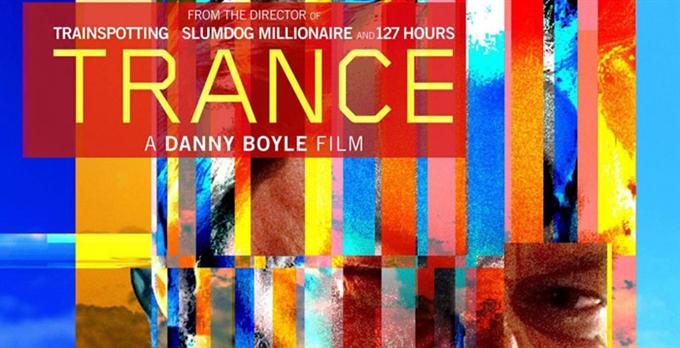Danny Boyle is back with a movie filmed at the same time as he was making preparations for his triumphant Olympic opening ceremony. Trance is, perhaps, the film in Boyle’s career which most resembles his startling debut Shallow Grave featuring, as it does, a three way power struggle between two men and a woman, and while Trance can’t live up to the excellence of that film, it is still a very enjoyable romp dealing with psycho-sexual game-playing that would make Hitchcock proud.
Simon (James McAvoy) is an auctioneer of fine art in gambling trouble. He arranges the perfect heist with Franck (Vincent Cassel) and his goon squad providing the muscle while he is the inside man. However, he has a plan of his own – to double cross them and keep the painting for himself. Only problem is that, in the course of the robbery he is hit over the head and forgets what he has done with the painting. Franck enlists the help of Elizabeth (Rosario Dawson), a hypnotherapist, to put him into a trance and help him remember. And that’s all you need to know.
The difficulty with a film as twisty and turn-y as this is that if you start to reference anything else that might be like it, the discerning viewer can start to piece together the plot, which would distract from the ongoing craziness. And it is crazy. I don’t think it hangs together when you come out of the cinema but – much like with last year’s mindbendingly brilliant Looper – that doesn’t matter. It’s all about the ride. You don’t go on a rollercoaster to admire the workmanship in the rails, you go for thrills and the spills, and it’s the same here. Which isn’t to say it’s “leave your brain at the door” material – do that and you’ll be lost – just that, when you walk out, don’t think about it too hard.
What stops it from being completely top drawer is that it lacks a certain elegance. The best films of this type – and I can mention The Usual Suspects without fear that it might help you as, twisty-turn-y-ness aside, the two bear no relation – need to do little at the point of reveal, the clarity of what has unfolded before you washes over you. Here we need a fair chunk of exposition to get to the bottom of all of that has gone before.
But as I said, it’s an enjoyable, if slightly bonkers, ride. Any film that can use a form of personal topiary as a plot point has some chutzpah. And just because it’s not Boyle’s best (for me, 127 Hours), doesn’t mean it’s not a hell of a lot better than what a lot of other people have to offer.
B
